How Story School hit $100K in under a year with a low-ticket paid challenge
What if your next business breakthrough didn’t come from ads, webinars, or complex funnels—but from a $20 challenge?
That’s exactly how Ashley Renders built Story School, a thriving community where entrepreneurs learn to master storytelling and grow their businesses. Together with her community manager, Court, she leads The Storytelling That Sells Challenge—a monthly two-day live event that introduces entrepreneurs to storytelling and guides them into her premium program.
The results came fast. In less than a year, this low-ticket offer brought in more than $100k in revenue—and a few months later, nearly doubled again.
This is the power of a well-built challenge funnel. When done right, it becomes more than an event or a class. It’s an experience people don’t want to leave.
In this article, we’ll take you behind the scenes. You’ll see how Story School blends live coaching, community rituals, and gamification into a seamless funnel inside Circle. And you’ll walk away with a playbook for building your own low-ticket challenge that feels simple, delivers real value, and converts.
The paid challenge that built a school
Before Story School, Ashley Renders worked for years as a film producer. It was her dream job on paper. But another dream kept calling: building her own business.
She began small by posting daily reels on Instagram, sharing her story and teaching others to do the same. Within months, she built an audience of more than 20,000 people who wanted to learn storytelling from her.
When it was time to turn that momentum into revenue, she started small—with a paid challenge.
“I don’t have a website,” Ashley explains. “Sixteen months into my business journey, and I still don’t have one. I’m running my business completely through organic social media.”
Her first Storytelling That Sells challenges ran in Facebook, patched together with tools like Stan Store and Zapier. Then she moved to Circle to bring everything together in one place.
“All we needed was a landing page to bring people over,” she explains, which she quickly whipped up in Notion. “It literally took me 10 minutes to build it, and I did it on a train.”
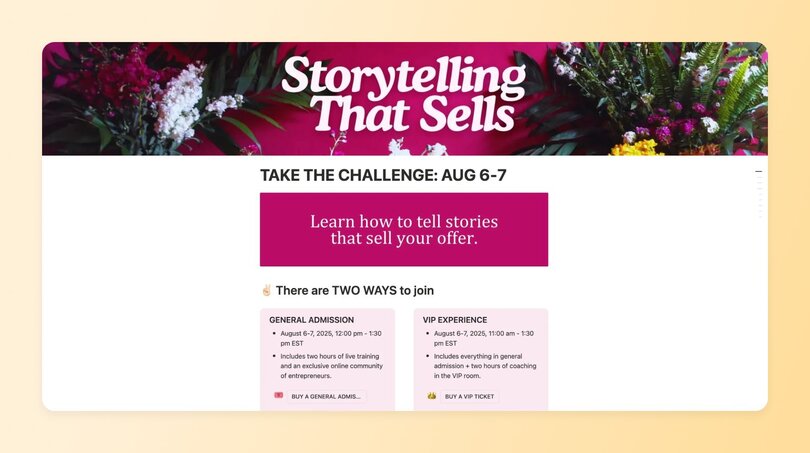
💻 Now, that landing page lives right beside her Circle community, thanks to Circle’s Website Builder.
This scrappy start became the foundation for Story School’s growth. The challenge community now feeds directly into her live coaching experience and premium membership.
The community breakdown:
📍 Community: Story School
👋 Founder: Ashley Renders
🗓️ Launched on Circle: April 2025
🌟 Size: 720 active members
🎯 Purpose: Help entrepreneurs master storytelling and grow their businesses
💰 Pricing model: $20–$67 challenge; $4,494 annual membership
The simple community funnel that converts
So what makes a paid challenge work so well?
At its core, it’s a time-boxed, live learning sprint. The price is low enough to feel like a no-brainer, but high enough to prove intent. Participants commit, show up, and get a preview of what your premium community delivers.
How the funnel works
Ashley treats her social channels as the first step of her funnel.
“My Instagram account and my YouTube are the original community,” she says. “There’s a big desire for people to go into smaller communities off social media because it feels so distracting and overwhelming. But you have to treat your socials as the first community.”
From there, the challenge funnel is simple:
- Social content points to a Notion landing page (now built on Circle.)
- The page links to a paywall with two options:
- $20 General Admission: Two 90-minute trainings + private community
- $67 VIP: Adds two hours of live coaching with Ashley
- The two-day challenge runs live with group coaching and Q&A.
- Locked community spaces preview what members unlock inside Story School, with paywalls leading directly to checkout.
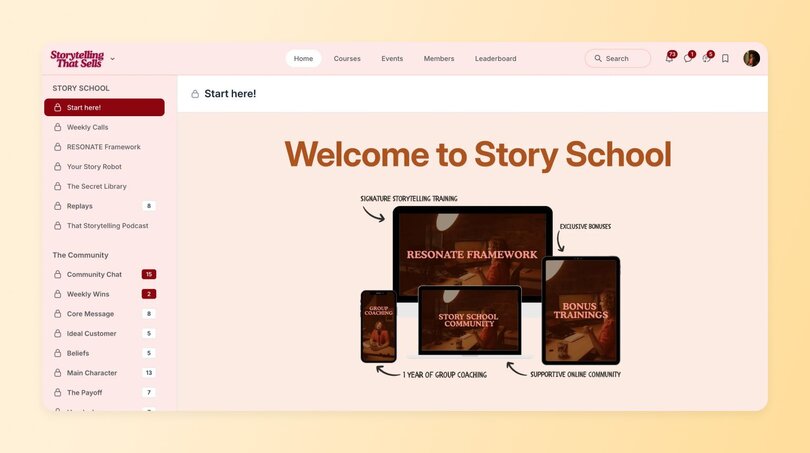
Why it converts
The funnel works because it maps directly to buyer psychology:
- Commitment: A $20 payment shows intent.
- Momentum: A two-day timeline delivers quick wins.
- Social proof: Seeing peers succeed inspires action.
Ashley puts it plainly: “It’s a no-brainer. People get two days of live training and coaching for such an affordable price. We do such great work in there that they keep coming back.”
The community experience inside the challenge
When people enter the Storytelling That Sells challenge, they immediately join a live room. Cameras are on. Questions come quickly. The chat fills with stories and feedback. It feels alive—and that’s the point.
The design behind the challenge experience
Ashley and Court designed the experience with two goals: to teach storytelling in a hands-on way and give people a real taste of what it’s like to work with them inside Story School.
Group coaching sits at the center. Participants are asked to bring questions, share their sticking points, and work through them with one another.
Court calls it “a two-day immersion”. Participants get to live inside Story School for a short stretch, shoulder-to-shoulder with peers who are also building their businesses, as well as see what else is offered.
How it’s structured
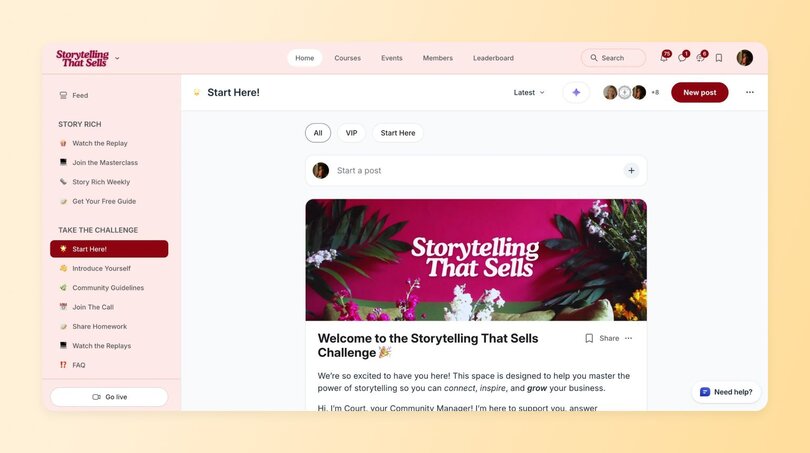
The community structure for the challenge is simple, but intentional:
- Start Here: A clear onboarding space with FAQs and guidelines that handle the basics so nobody gets stuck.
- General Admission: Two daily 90-minute sessions and a private space.
- VIP Room: An extra hour of direct coaching with Ashley each day for VIP customers.
- Homework Prompts: Shared after each session to spark reflection and discussion.
When challengers upgrade into Story School, they enter a community already in motion. Some are new, others are six months in. The rolling enrollment style is deliberate. It allows newcomers to learn from peers who are further along, and gives long-time members the opportunity to reflect on their journey.
For those who aren’t ready to upgrade, there’s no pressure to leave. They stay inside Circle, able to DM Ashley and Court, join future challenges, or step into Story School when the timing feels right. The door doesn’t close after two days.
Rituals that keep members coming back
The challenge is the spark. Story School is the fire that keeps burning.
Ashley and Court introduced simple rituals that make showing up easy—and staying, natural:
Here’s what that looks like in practice:
- Community Chat + Office Hours: Blending a watercooler space for quick questions, updates, or casual conversation with office hours is a genius way to answer a bulk of questions in one go.
- Weekly Wins: A space for members to share progress. Writing a caption, scheduling a post, booking a client. Every step counts.
- Coworking Calls: A weekly Pomodoro-style focus session led by Court. Members set intentions, work in 25-minute sprints, check in, and repeat the process. It’s simple, but the accountability keeps people coming back.
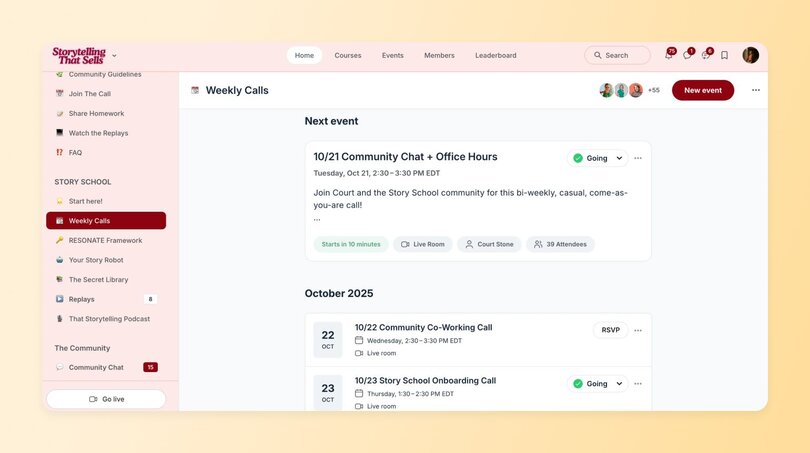
Over time, these rituals have shaped the culture of Story School. A member suggested a shared playlist, and now the community has one. Others tune in quietly from jobs or errands just to be part of the room.
As Ashley puts it, “Rituals create conversation—that’s the cheat code.” They surface the exact language entrepreneurs use to describe their struggles, providing members with both support and insight they can apply immediately.
Gamification that drives transformation
In Story School, every reward connects to actions that move members forward in their storytelling journey.
Court and Ashley customized Circle’s gamification workflows to align with their teaching framework. Members earn points for the activities that matter most:
- Completing storytelling course modules
- Posting original content in the community
- Attending live calls and trainings
- Giving feedback on other members’ work
Each action builds momentum. Members see themselves leveling up, and the rewards give them a reason to keep going.
The biggest motivator is the reward at level six: access to the AI Story Robot.
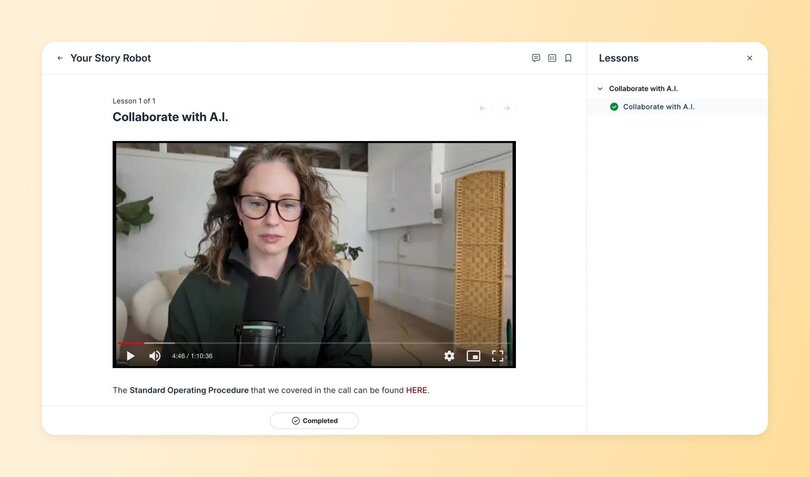
Court calls it “an AI in your back pocket.” Ashley designed a prompt system that mirrors her storytelling framework. Once unlocked, members can feed it raw ideas and generate content, such as social captions, newsletters, and even podcast scripts—already shaped into Story School’s format.
Ashley explains: “It’s like a storytelling calculator. You don’t know if you’re getting a good result from AI until you know what a good story looks like. That’s why the bot only unlocks after members have learned the principles.”
Gamification in Story School builds skills step by step. Members finish lessons. They practice in public. They give and receive feedback. And at level six, they gain a tool that makes applying everything faster.
Results that speak for themselves
The numbers behind Story School show just how powerful this model can be. Each challenge fuels momentum, and the community delivers results that continue to compound.
Here’s what that looks like:
- 50–80 people join every challenge. A steady wave of new entrepreneurs enters each round.
- 10–15% upgrade into Story School. At $3,497 per membership (now $4,494), the challenge funnel consistently converts participants into long-term members.
- 69% of posts come from members. Community engagement is member-led, with conversations and feedback driving activity.
- 33 live events in two months. Trainings, coworking calls, and group sessions provide members with numerous touchpoints.
“We’re constantly listening,” says Court. “When members ask for something, we create a space for it.”. That feedback loop keeps the community alive. Members feel heard, and the spaces evolve to match what they need most.
The cycle repeats. New challengers join. Some convert. The community grows and the culture deepens. The funnel works because the experience delivers.
Lessons for coaches and creators
Ashley and Court’s success offers clear takeaways for anyone building a coaching or education business:
- You don’t need a website (to start). Ashley launched with a Notion page and Circle. Instagram and YouTube content fueled the challenge funnel, without ads or a complicated tech stack.
- Treat challenges as decision points. A paid challenge is a learning sprint, but it’s also where people decide if they want more. Participants get a feel for your style, energy, and community and that makes moving into a longer program a natural next step.
- Design for connection. Ashley models Story School after a classroom, with live coaching, homework, and feedback loops. People learn faster when they feel seen and supported.
- Care about results. Ashley and Court check in weekly on who’s posting, who’s showing up, and who might need outreach. They even brought in education experts to refine milestones. As Ashley says, “what it comes down to is caring about people and deeply caring about their results.”
- Be specific. The transformation you deliver has to be aimed at a clear person. Story School speaks directly to women entrepreneurs at a particular stage of their journey, which makes the offer land.
Paid challenges work when they create transformation and belonging. That spark keeps people moving forward into your community.
And Circle makes the whole system possible: payments, paywalls, live events, community spaces, automations, rewards—all in one place.
If you’ve been waiting to try your own paid challenge, now’s the time. Start your 14-day Circle free trial today. Start small. Deliver value. And see how far you can go.